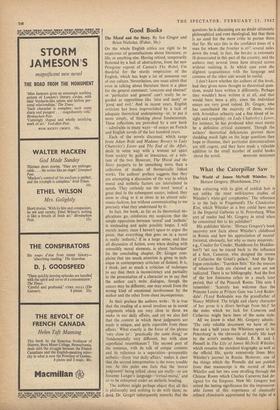Good Books
The Moral and the Story. By Ian Gregor and Brian Nicholas. (Faber, 30s.) ON the whole English critics are right to be suspicious of generalisations about literature, or life, or anything else. Having retired, temporarily flattened by a hail of abstractions, from the new Peregrine reprint of Camus's The Rebel, I'm thankful for the sturdy empiricism of the English, which has kept a lot of nonsense out of our culture. Nevertheless, one must admit that even in talking about literature there is a place for the general statement; 'concrete and abstract' or 'particular and general' can't really be re- garded as oppositions like 'nice and nasty' or 'good and evil.' And in recent years, English criticism has been impoverished by a lack of adequate theoretical underpinning—or, to put it more simply, of thinking about fundamentals. These reflections are provoked by a new book —admirable in many ways—of essays on French and English novels of the last hundred years.
Each of the novels discussed, which range from Adam Bede and Madame Bovary to Lady Chatterley's Lover and The End of the Affair, deals in some way with a woman set apart from society by guilt or innocence, or a mix- ture of the two. However, The Moral and the Story purports to be something more than a collection of studies of thematically linked works. The authors' preface suggests that they are attempting a discussion of the way in which moral and aesthetic factors are interrelated in novels. They certainly use the word 'moral' a great deal in the subsequent essays; indeed, they seem to cling to it at times in an almost talis- manic fashion, but without communicating to me precisely what they understand by it.
In fact, the book, as far as its theoretical im- plications go, reinforces my suspicion that the simple opposition between 'moral' and `aesthetic' is misleading and quite possibly bogus. I will merely assert, since I haven't space to argue the point, that everything that goes on in a novel is really `xsthetic,' if in a large sense, and that all discussion of fiction, even when dealing with ostensibly moral elements, is about 'technique' (in the concluding chapter, Dr. Gregor com- plains that too much attention is given to tech- nique in contemporary criticism of fiction). It is, I think, just as much a criticism of technique to say that there is inconsistency and partiality in the presentation of a character as to say that the author can't write dialogue, though the causes may be different; one may result from the wrong kind of emotional involvement by the author and the other from sheer incompetence.
In their preface the authors write : 'It is. true that the reading of a novel involves us in moral judgments which are very close to those we make in our daily affairs, and yet we also feel that the context in which these judgments are made is unique, and quite separable from those affairs.' What exactly is the force of the phrase 'very close to': 'practically the same thing,' or `fundamentally very different, but with close superficial resemblances'? The second part of the sentence, with its talk of unique contexts and its reference to a separation—presumably xsthetic—from 'our daily affairs,' makes it clear that the second interpretation is the more tenable one. At this point one feels that the 'moral judgments' being talked about are really—to use Susanne Langer's language—`virtual-moral,' and so to be subsumed under an xsthetic heading.
The authors might perhaps object that all this is philosophy and nothing to do with them; in- deed, Dr. Gregor subsequently remarks that the
questions he is discussing are no doubt ultimately philosophical and even theological, but that there is no need for the mere critic to pursue them that far. He says this in the confident tones of a man for whom the frontier is sti:1 several miles down the road; in fact, the border is extremely ill-demarcated in this part of the country, and the authors may several times have strayed across without realising it. In which case even the slightest acquaintance with the language and customs of the other side would be useful.
I don't know whether the authors of this book, had they given more thought to theoretical ques- tions, would have written it differently. Perhaps they wouldn't have written it at all, and that would have been a pity, since the individual essays are very good indeed. Dr. Gregor, who has contributed the majority of them, writes with Arnoldian urbanity and a fine ,blend of in- sight and sympathy; on Lady Chatterley's Lover, for instance, he has produced what must surely be a definitive critical statement. Though the authors' theoretical deficiencies prevent them shedding much light on the large questions they hope to illumine, their particular demonstrations are still cogent, and they have made a valuable addition to the small number of useful books


































 Previous page
Previous page